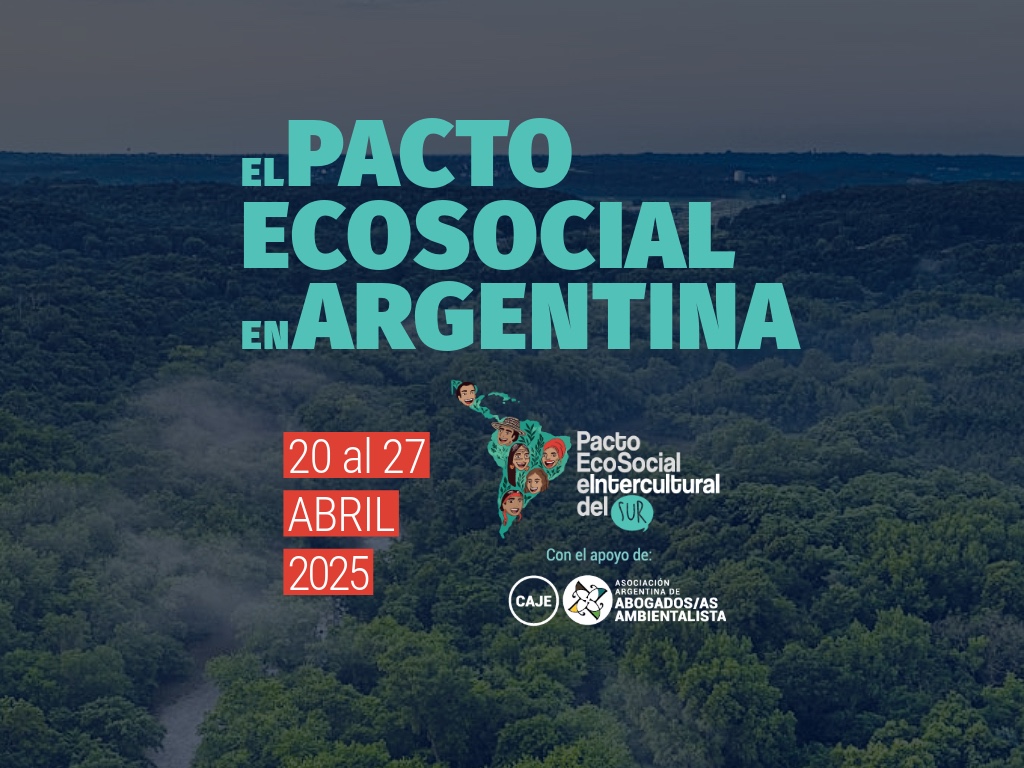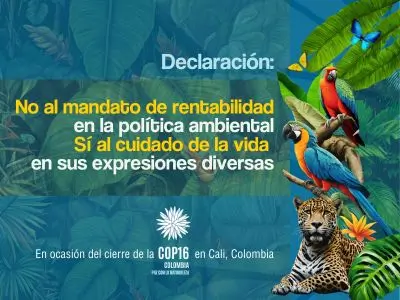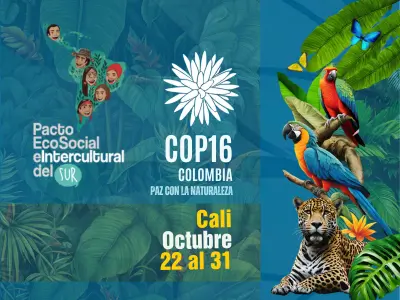
DECLARATION OF THE ECOSOCIAL AND INTERCULTURAL PACT OF THE SOUTH
On May 17, 2023, the Brazilian Institute of the Environment and Renewable Natural Resources (IBAMA), an agency of the Ministry of Environment and Climate Change responsible, among other things, for environmental impact assessments and granting environmental licenses, denied Petrobras authorization for oil exploration in the Foz do Amazonas basin, in the state of Amapá.
In a detailed report, IBAMA outlines the history of the process, which began in 2014 with the British oil company BP, and highlights a series of «technical inconsistencies,» while also pointing out the foreseeable impacts on unique ecosystems and local communities, including three indigenous territories in the Oiapoque region. As stated by the president of IBAMA, Rodrigo Agostinho, «the Foz do Amazonas basin is a region of extreme socio-environmental sensitivity, with conservation units, indigenous territories, mangroves, biogenic formations of organisms such as corals and sponges, as well as a great marine biodiversity with species threatened with extinction.»
The repercussions were not long in coming and are generating a strong internal crisis in the Lula government. Petrobras says it will appeal the decision and, if not allowed to operate in that region, it even considers shifting oil exploration to neighboring areas belonging to Guyana and Suriname. The Ministry of Mines and Energy and the pro-fossil progressive forces in the executive and society have also raised their voices against the decision, using nationalist arguments such as: «It is a decision against the interests of the country,» «Either we exploit it, or others will.» Representatives of the Amapá government argue that those who criticize the exploitation project in the region are acting against improvements in the living conditions of the local poor population, although historically, extractive and energy mega-projects in Brazil have resulted in food insecurity, crime, and health crises instead of the promised socialization of benefits. At the same time, right-wing groups are seizing the opportunity to criticize the Lula government and destabilize it from the legislative power, launching direct attacks on the Ministry of Environment, and paving the way for a strategy to undermine the competencies and capacities of the newly established Ministry of Indigenous Peoples.
In the face of this ordeal, Lula, who has made the environmental and climate agenda an important part of his campaign, initially supported the decision of IBAMA and the Minister of Environment, Marina Silva. Later, in an interview during the G7 meeting in Japan, the president expressed doubt about the negative impacts on the Amazon, as the proposed oil exploitation would take place in “deep waters”. However, Brazil’s environmental challenges are not limited to the Amazon rainforest and deforestation. Lula was elected with a platform of climate leadership and ecological transition. Giving up on that now in the name of governance is a grave mistake. Succumbing to the pressure of old left-wing nationalist developmentalism, along with the interests of fossil capital and the seductive appeals of green capitalism, could lead to a historical setback.
No more oil!
From the Ecosocial and Intercultural Pact of the South, we celebrate the decision of IBAMA, which, inspired by strict technical parameters, also sends an important political message: oil exploration in the Amazonian region is incompatible with its protection.
We also salute the efforts of activists, ecological movements, and territorial movements in Brazil in their struggle to halt this and other projects that destroy ecosystems, territories, and life.
The peoples of our Latin America must come together in the fight to leave oil in the ground. There have already been many struggles in the past two decades that have halted the expansion of oil in their territories or are working towards it. As Oilwatch has taught us, ceasing to extract oil, gas, or coal is a way to confront the climate crisis; continuing to do so, on the contrary, means deepening the disaster. Even the International Energy Agency, which has little to do with environmentalism since it represents the world’s major oil importers, recommends leaving two-thirds of all fossil fuel reserves in the ground to prevent a temperature increase of 1.5º Celsius, which would lead to a major catastrophe. Therefore, it is also crucial to support the Ecuadorian people in the #SíAlYasuní movement, as they face an imminent popular consultation that could decide to indefinitely keep the existing crude oil in the ground in the magnificent biodiversity and home to peoples in voluntary isolation in Yasuni National Park.
To those who claim that there are no political-institutional alternatives, let’s look at Colombia, where the government announced in 2022 the suspension of new hydrocarbon explorations and committed to a gradual, fair, and orderly energy transition. Despite the undeniable contradictions and difficulties, this decision opens up new horizons. From the Ecosocial and Intercultural Pact of the South, together with Censat Agua Viva and other organizations, we have developed the document Planned Reduction of Fossil Dependency in Colombia, with proposals that allow us to transition towards defossilization with eco-social justice. Either the ‘new progressivisms’ move in this direction or they will increasingly resemble the right-wing parties.
All of the above is in line with a widespread collective sentiment among our peoples and challenges us to build a just energy transition with a Latin American perspective. As correctly emphasized by the Fossil Fuel Non-Proliferation Treaty, the gradual elimination of fossil fuel extraction requires unprecedented international cooperation.
The role of Brazil in this process is crucial. That is why we view with great concern a possible setback in the course initially proposed by President Lula’s government.
What kind of energy transition do we want?
Energy transition is incompatible with further oil extraction, and developmentalism is incompatible with a just energy transition. In recent months, the debate on energy transition has reached Brazilian institutions but in a limited and problematic way: as a market-oriented model, seduced by the possibility of renewable energy exports (mainly through the development of green hydrogen), and a program for expanding solar and wind energy dependent on private investment, whose current experiences are marked by territorial and community conflicts, as we are currently witnessing in the state of Ceará. Moreover, the prospect of more oil extraction hinders the possibility of transition, as it involves an expansion model of the energy matrix based on the diversification of energy sources that are often unsustainable, instead of relying on truly renewable energies associated with a gradual reduction in fossil fuel dependency as the foundation for other economic production and consumption structures supported by social justice and harmonious relationships with nature. It is evident that it is not simply about replacing fossil fuels with new, more sustainable energy sources in an attempt to maintain the path of predatory capitalism in social and environmental aspects.
Brazil has a historical record of human rights and environmental violations in its efforts to generate electricity. Let us remember the case of the Belo Monte hydroelectric power plant. We also cannot overlook the serious socio-ecological crimes caused by mega-mining in Mariana and Brumadinho, to mention just two of the most prominent cases.
A just energy transition program for Brazil should promote the development of renewable energies in a democratic, decentralized, and deconcentrated manner, in collaboration with affected communities and under a mixed vision of energy distribution. As a state-owned company, Petrobras can play an important role in the transition, but it must do so with a commitment to a gradual elimination of fossil fuel extraction, deepening the practice of energy access as a right rather than a commodity. The recovery of Eletrobras, the agency responsible for electricity distribution, privatized in 2022, is also necessary.
Current conditions hinder real progress in terms of democracy and a popular and truly just energy transition because they approach the renewable sector as a potential for capitalist economic growth and are involved in the thirst for strategic minerals that deepen extractivist patterns in the name of excessive resource consumption in the Global North. Brazil, like the rest of Our America, needs a comprehensive program for energy and ecological transition that coordinates different areas of the government and expands the necessary public investment, increasingly involving rural and urban communities in this process. In fact, the new fiscal rules proposed by the Ministry of Finance and recently approved by the legislature limit the capacity for investment in this transition, once again facilitating the presence of multinational corporations in their investor and extractivist roles.
In the face of this new offensive against the people and nature in Brazil, we must strengthen our resistance. Brazilian organizations and social movements, including the MST (Landless Workers’ Movement), who are constantly criminalized, must be heard. They are the ones who have the greatest knowledge of debates on food, climate, energy, and nature. They not only possess extensive knowledge but also have the legitimacy of lived practice, that is, many everyday experiences that demonstrate how the energy transition—and the broader ecosocial transition—is not just a promise for the future but is already underway from the communities and territories.
Let’s accept it: the only way to build a just energy transition is with indigenous people, farmers, marginalized communities, women, environmentalists, and workers. From the Ecosocial and Intercultural Pact of the South, we stand alongside these struggles and proposals that seek to build ecosocial transformation in Brazil, and therefore, stand against any form of false transition inherent in green capitalism, which, instead of solving the climate crisis, deepens it.




Comments are closed.